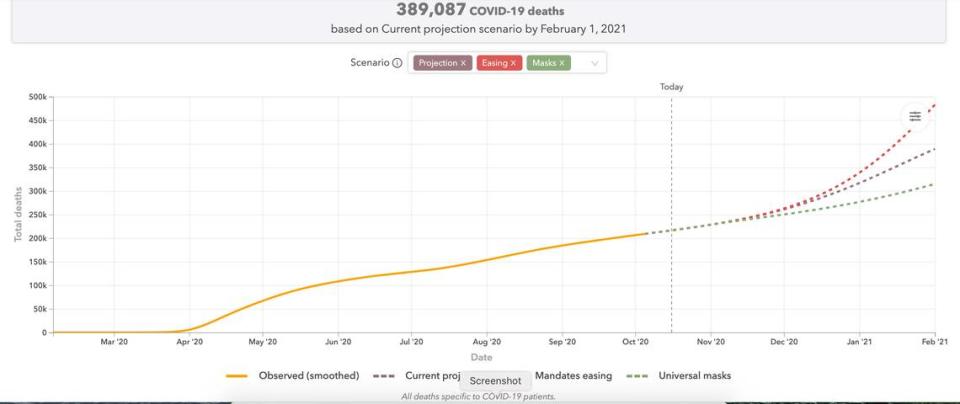Trump says coronavirus is ‘rounding the corner.’ Data and experts suggest otherwise
President Donald Trump said during a Thursday town hall event that COVID-19 is “rounding the corner,” despite data and experts predicting an increase in cases during the winter.
Trump defended his handling of the pandemic at the town hall, which took place in Miami and aired on NBC. Democratic presidential nominee Joe Biden also spoke at a town hall, which aired the same time as Trump’s on ABC.
“We’re a winner,” Trump said. “We have done an amazing job. And (the coronavirus pandemic is) rounding the corner. And we have the vaccines coming and we have the therapies coming.”
“Relative to the rest of the world we have the worst death rate,” moderator Savannah Guthrie replied.
“I have things right here that will tell you exactly the opposite,” Trump said.
Trump’s comments come less than three weeks from Election Day as he faces criticism for his response to the coronavirus outbreak.
The president has long downplayed the coronavirus pandemic, predicting dozens of times that it will “go away” as cases and deaths continue to rise, The Washington Post reported. In February, he said “a lot of people think (coronavirus) goes away in April with the heat” and, in the same month, predicted that coronavirus cases would be “down to close to zero” in “a couple of days.”
In June, Trump said the coronavirus was “dying out,” video shows, and in August he said “it is going to be gone soon.”
More than 7.9 million in the U.S. have tested positive for the coronavirus as of Friday, Oct. 16, according to Johns Hopkins University, and 217,000 have died nationwide. The U.S. leads the world in total deaths attributed to the coronavirus, data show, but is fifth in the world for deaths per 100,000 people behind Peru, Brazil, Spain and Mexico.
Experts, data say coronavirus is here to stay — for now
Despite Trump’s comments, experts and data suggest the coronavirus is not heading out the door anytime soon.
In fact, experts have explored the idea of the coronavirus becoming endemic, meaning it will regularly reappear and cause recurring outbreaks, similar to the common cold, which is also a type of coronavirus.
One model from the Institute for Health Metrics and Evaluation (IHME) at the University of Washington School of Medicine predicts, at the current rate, there will be at most around 389,087 deaths in the U.S. by Feb. 1. That means about 171,000 more people would die in the next four months.
But the model warns deaths could increase if preventive mandates ease across the country — with at least 482,931 deaths by Feb. 1. Meanwhile, if all Americans wear masks, then the country could save about 168,000 people from dying when compared to worst case scenario.
The newest predictions come as experts warn of a third peak in confirmed coronavirus cases in the U.S. — the first striking about April 10, the second by July 19 and the third about Oct. 13, according to The New York Times.

“We are headed in the wrong direction, and that’s reflected not only in the number of new cases but also in test positivity and the number of hospitalizations,” Dr. Caitlin Rivers, an epidemiologist at Johns Hopkins University, told the newspaper. “Together, I think these three indicators give a very clear picture that we are seeing increased transmission in communities across the country.”
“We are starting from a much higher plateau than we were before the summer wave,” Rivers continued. “It concerns me that we might see even more cases during the next peak than we did during the summer.”
Thursday, Oct. 16 marked the first time since late July that daily reported coronavirus cases in the U.S. surpassed 64,000, media outlets reported.
Only eight states — Alabama, Delaware, Hawaii, Kentucky, Louisiana, Maine, Texas and Vermont — are showing decreases in new cases compared to the previous week, according to CNN.
At the same time, 35 states are seeing spikes in new infections greater than 10% over the last week, the outlet reported. And this week alone, “21 states have hit their peak 7-day average of new cases since the pandemic began.”
Herd immunity as a way out?
Some politicians have suggested using a herd immunity approach to overcoming the coronavirus, but most scientific experts have condemned the idea as dangerous and ineffective.
Herd immunity suggests allowing those in low-risk populations such as children and young adults to become infected during large uncontrolled outbreaks in hopes of them attaining natural immunity to the disease, while protecting the most vulnerable, including older adults and those with underlying medical conditions.
A group of 80 international scientists published a letter Thursday warning the world about the risks surrounding a herd immunity approach, stating it’s “a dangerous fallacy unsupported by scientific evidence,” McClatchy News previously reported.
They say such a strategy won’t end the pandemic, but result in “recurrent epidemics,” and lead to an overwhelmed health care system and workforce.
Dr. Anthony Fauci, director of the National Institute of Allergy and Infectious Diseases and member of the White House Coronavirus Task Force, said herd immunity is “very dangerous.”
“If you let infections rip as it were and say, ‘Let everybody get infected that’s going to be able to get infected and then we’ll have herd immunity.’ Quite frankly that is nonsense, and anybody who knows anything about epidemiology will tell you that that is nonsense and very dangerous,” Fauci told Yahoo! News.

